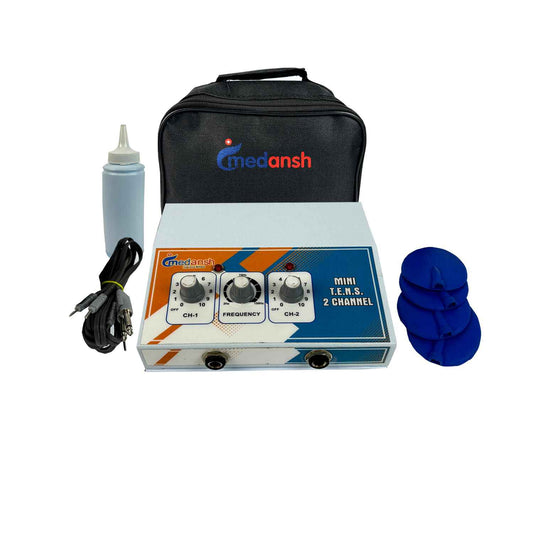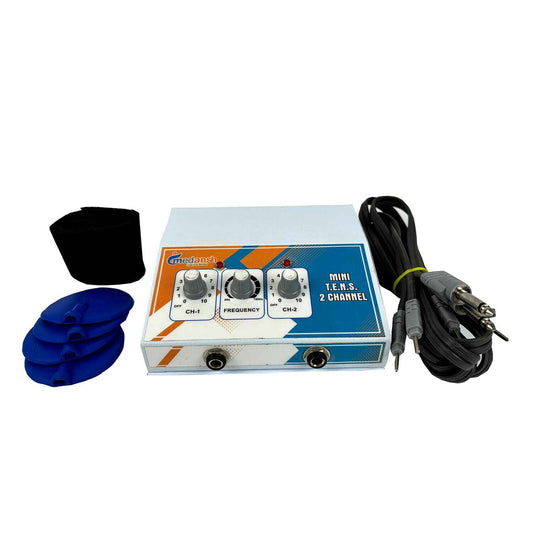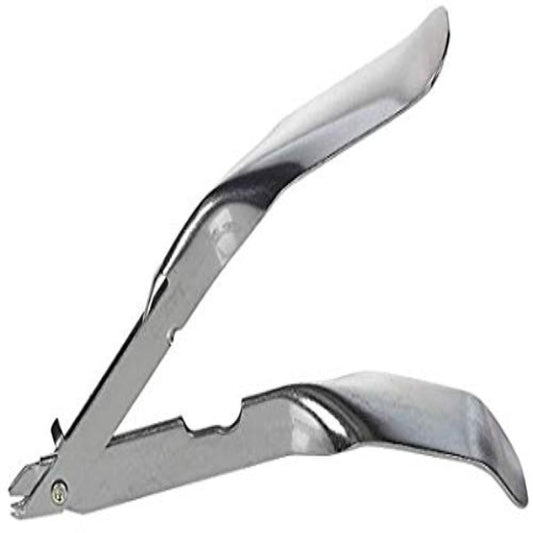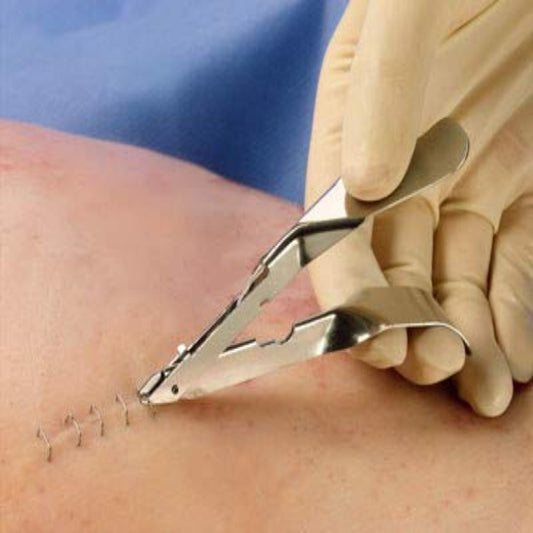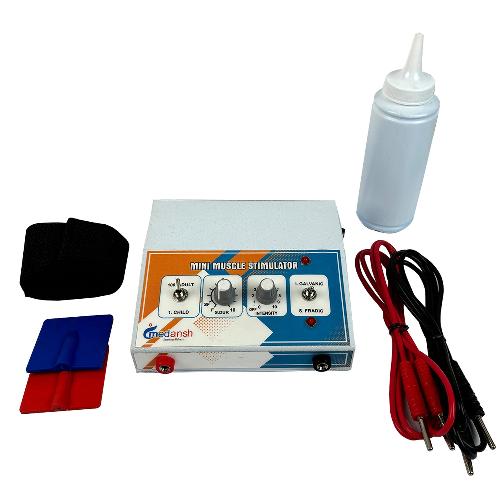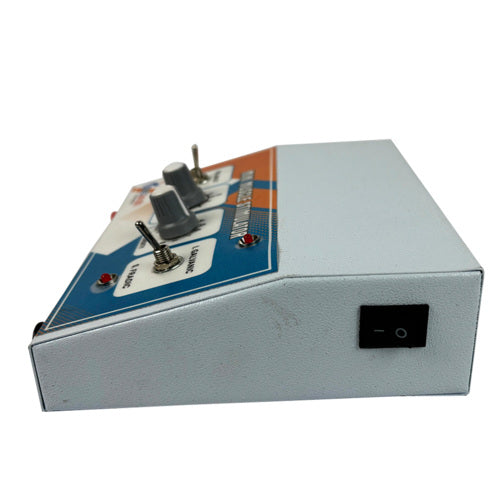-
Mini Portable 5W LED Flashlight – Ideal for Medical Use The Bright Aluminum Alloy 5W LED Flashlight is a compact, lightweight, and durable tool designed for medical professionals and students. Its powerful LED light ensures clear visibility during physical examinations, making it an essential...
- Rs. 299Inclusive of all taxes
Rs. 400- Rs. 299
- Unit price
- per
Save Rs. 101Inclusive of all taxes
-
This best-in-class pulse oximeter ensures accurate measurement of functional oxygen saturation (SpO2) and pulse rate. Designed for both home and clinical use, it is ideal for critical care monitoring, as well as for individuals with COPD, heart conditions, pneumonia, or other respiratory ailments. Key...
- Rs. 919Inclusive of all taxes
Rs. 1,150- Rs. 919
- Unit price
- per
Save Rs. 231Inclusive of all taxes
-
IV Stand - Chrome Plated with Metal Base The IV Stand (Chrome Plated with Metal Base) is an essential medical device used in hospitals and clinics to support intravenous (IV) drips. It ensures smooth and uninterrupted administration of fluids and medications directly into the...
- Rs. 1,599Inclusive of all taxes
Rs. 2,000- Rs. 1,599
- Unit price
- per
Save Rs. 401Inclusive of all taxes
-
It is time that you bid farewell to the age-old struggle with regular thermometers where you had to wait long until it got back to the zero mark for you to use it again. Non-Contact IR Thermometer which has infrared technology works without coming...
- Rs. 869Inclusive of all taxes
Rs. 1,130- Rs. 869
- Unit price
- per
Save Rs. 261Inclusive of all taxes
-
Our Gynecological Aspiration Kit (MVA Kit) is a reliable choice for safe and effective uterine aspiration procedures. Specifications: Designed for uterine aspiration. Includes necessary components for the procedure. Sterile and single-use for patient safety. Precise and controlled suction. Suitable for medical professionals. Key Features:...
- Rs. 1,977Inclusive of all taxes
Rs. 2,299- Rs. 1,977
- Unit price
- per
Save Rs. 322Inclusive of all taxes
-
A stature meter is used to determine a person's or a baby's height. This stature meter has a range of up to 78 inches (200 cm). Key Features: Height stature meter with retractable measure tape Easily measure adults and children at home, office,...
- Rs. 491Inclusive of all taxes
Rs. 699- Rs. 491
- Unit price
- per
Save Rs. 208Inclusive of all taxes
-
Locating the vein while drawing out blood samplefor numerous reasons such as different blood tests, collection of samples canbe of a huge hassle. Similarly, figuring out where the vein is - with naked eyes and bare hands in order to place the IV channel correctly,...
- Rs. 2,299Inclusive of all taxes
Rs. 7,360- Rs. 2,299
- Unit price
- per
Save Rs. 5,061Inclusive of all taxes
-
Enhance precision and visibility with the LED Surgical Headlight, designed for medical professionals who require a focused and bright light source during procedures. This lightweight, comfortable headlamp ensures optimal illumination with its adjustable intensity and angle, making it ideal for surgeons, dentists, ENT specialists,...
- Rs. 3,679Inclusive of all taxes
Rs. 4,600- Rs. 3,679
- Unit price
- per
Save Rs. 921Inclusive of all taxes
-
The classic pneumatic tourniquet is a dependable device usedduring amputations to restrict blood circulation in the limbs. It has a strongand accurate manometer for precise measurements, as well as a particularly longservice life. Package content: Sturdy metal pump to produce pressure. Small, Medium, Large...
- Rs. 1,839Inclusive of all taxes
Rs. 2,760- Rs. 1,839
- Unit price
- per
Save Rs. 921Inclusive of all taxes
-
More sizes availableThe needle is a major equipment which is required at all time in the hospital and a doctor’s clinic. It is used to collect blood samples, inject medicines and even IV fluids into the blood stream through the veins, etc, and none of the...
- From Rs. 1,839Inclusive of all taxes
Rs. 2,760- From Rs. 1,839
- Unit price
- per
Save Rs. 921Inclusive of all taxes
-
IV Stand Stainless Steel with Fiber Base - the perfect solution for hospitals and medical facilities in need of a reliable and durable IV stand. This IV stand is designed to provide support and stability for IV bags and other medical equipment. Key Features:...
- Rs. 1,749Inclusive of all taxes
Rs. 3,000- Rs. 1,749
- Unit price
- per
Save Rs. 1,251Inclusive of all taxes
-
( Prepaid or Partial COD Options are available for this product. Please call or WhatsApp us at 8586012345 ) Upgrade your workspace or home with our Deluxe Stainless Steel Bench. Sturdy, hygienic, and stylish, it's perfect for various applications.Specifications:Premium Material: Crafted from high-grade stainless...
- Rs. 12,999Inclusive of all taxes
Rs. 14,000- Rs. 12,999
- Unit price
- per
Save Rs. 1,001Inclusive of all taxes
-
The Infantometer Baby Height Measurement Scale is a vital tool for tracking your child's growth. With a length of 18 inches and precise markings in both inches and centimeters, it ensures accurate height measurements for infants.Specifications:Accurate Measurements: The scale provides precise height measurements.Dual Markings: Markings in...
- Rs. 1,499Inclusive of all taxes
Rs. 2,000- Rs. 1,499
- Unit price
- per
Save Rs. 501Inclusive of all taxes
-
LED Surgical Headlight – Precision & Comfort for Medical Professionals 🔹 Ideal for: Microsurgery | Dental | ENT | Orthopedic | General Surgical Procedures This high-quality LED Surgical Headlight is designed for maximum comfort and precision. Featuring an adjustable headband, it ensures a...
- Rs. 5,799Inclusive of all taxes
Rs. 7,500- Rs. 5,799
- Unit price
- per
Save Rs. 1,701Inclusive of all taxes
-
Looking for a durable and reliable IV stand for your medical facility? Our IV Stand All Stainless Steel Incl Base is a great option. Made from high-quality stainless steel material, this IV stand is built to last and provide reliable support for IV bags...
- Rs. 3,299Inclusive of all taxes
Rs. 5,000- Rs. 3,299
- Unit price
- per
Save Rs. 1,701Inclusive of all taxes
-
Stainless Steel Boyles Apparatus Anesthesia Machine Reliable | Safe | Versatile The Stainless Steel Boyles Apparatus Anesthesia Machine is a high-performance medical device designed for anesthesia management in hospital settings. Equipped with an electric actuator, it allows smooth position adjustments, ensuring optimal patient comfort...
- Rs. 58,199Inclusive of all taxes
Rs. 69,000- Rs. 58,199
- Unit price
- per
Save Rs. 10,801Inclusive of all taxes
-
( Prepaid or Partial COD Options are available for this product. Please call or WhatsApp us at 8586012345 ) Our Standing Model Photo Therapy Unit is designed to provide safe and effective treatment for jaundice in newborns. This unit is equipped with the latest...
- Rs. 23,001Inclusive of all taxes
Rs. 41,400- Rs. 23,001
- Unit price
- per
Save Rs. 18,399Inclusive of all taxes
-
Product description The Punctum Dilator is a versatile instrument used in punctoplasty procedures to dilate the lacrimal punctum. Designed with high-quality polished tips and a knurled handle for enhanced grip and accuracy, it ensures precise and comfortable entry into the punctum. Double-ended design offers...
- Rs. 366Inclusive of all taxes
Rs. 644- Rs. 366
- Unit price
- per
Save Rs. 278Inclusive of all taxes
-
The LHP Chetal Forceps, made from high-quality stainless steel, is a durable and versatile surgical instrument used for handling sterile materials, dressings, and surgical instruments in medical and clinical settings. Designed for precision and control, these forceps ensure a firm grip while maintaining a...
- Rs. 1,333Inclusive of all taxes
Rs. 1,840- Rs. 1,333
- Unit price
- per
Save Rs. 507Inclusive of all taxes
-
The needle is a major equipment which is required at all time in the hospital and a doctor clinic. It is used to collect blood samples, inject medicines and even IV fluids into the blood stream through the veins, etc. and none of the...
- Rs. 1,747Inclusive of all taxes
Rs. 2,024- Rs. 1,747
- Unit price
- per
Save Rs. 277Inclusive of all taxes
Recently Viewed Products
Medansh
Example product title
- Rs. 20Inclusive of all taxes
- Rs. 20
- Unit price
- per
Inclusive of all taxes
Medansh
Example product title
- Rs. 20Inclusive of all taxes
- Rs. 20
- Unit price
- per
Inclusive of all taxes
Medansh
Example product title
- Rs. 20Inclusive of all taxes
- Rs. 20
- Unit price
- per
Inclusive of all taxes
Medansh
Example product title
- Rs. 20Inclusive of all taxes
- Rs. 20
- Unit price
- per
Inclusive of all taxes
Medansh
Example product title
- Rs. 20Inclusive of all taxes
- Rs. 20
- Unit price
- per
Inclusive of all taxes
Medansh
Example product title
- Rs. 20Inclusive of all taxes
- Rs. 20
- Unit price
- per
Inclusive of all taxes
Medansh
Example product title
- Rs. 20Inclusive of all taxes
- Rs. 20
- Unit price
- per
Inclusive of all taxes
Medansh
Example product title
- Rs. 20Inclusive of all taxes
- Rs. 20
- Unit price
- per
Inclusive of all taxes
Medansh
Example product title
- Rs. 20Inclusive of all taxes
- Rs. 20
- Unit price
- per
Inclusive of all taxes
Medansh
Example product title
- Rs. 20Inclusive of all taxes
- Rs. 20
- Unit price
- per
Inclusive of all taxes
- Choosing a selection results in a full page refresh.

